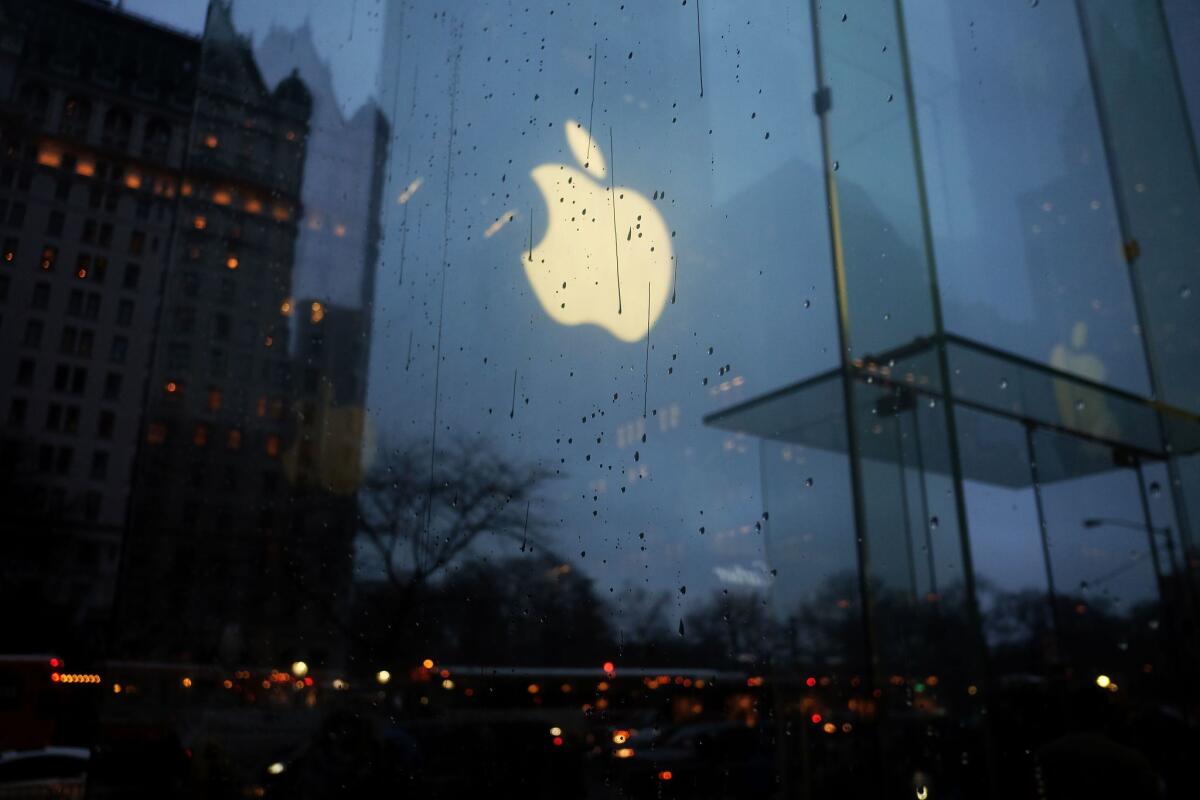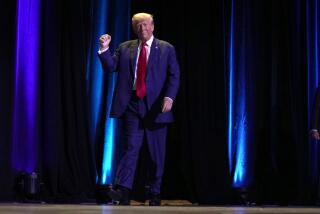In fight over locked iPhone, justice officials push back against Apple

Apple is battling the U.S. government’s order to circumvent security features on an iPhone that belonged to one of the San Bernardino attackers.
Justice officials on Thursday made the latest move in their high-stakes legal battle with Apple, pushing back against the technology company’s efforts to escape an order compelling it to help unlock a terrorist’s iPhone.
Looking to undermine the case Apple made in an earlier court filing, lawyers for U.S. Atty. Eileen Decker responded with a stinging retort that dismissed the technology giant’s legal reasoning as badly flawed and accused the company of deliberately trying to muddy the waters by portraying the case as a broad-stroke threat against the privacy of all Apple customers.
In making their case, justice officials renewed their claim that the company can be forced legally to write new software that would allow FBI agents to circumvent security features on an iPhone used by one of the killers in the December attack in San Bernardino. And they dismissed Apple’s contention that the work its engineers would need to do to help crack into the iPhone would impose an illegal burden on the company.
“This burden, which is not unreasonable, is the direct result of Apple’s deliberate marketing decision to engineer its products so that the government cannot search them, even with a warrant,” according to the filing in U.S. District Court in Riverside.
The sharp tone of the filing caught Apple executives off guard and, once again, ratcheted up the fiery rhetoric between the two sides.
“In my 30 years I’ve never seen a legal brief more intended to smear the other side with false innuendo,” Bruce Sewell, Apple’s senior vice president and general counsel, said in a call with reporters. He went on to call the filing “an unsubstantiated effort to vilify Apple,” “a cheap shot” and “an act of desperation.”
See more of our top stories on Facebook >>
After weeks of jockeying with Apple in a back-and-forth that has played out in legal briefs and bids to sway public opinion, Thursday’s filing was the government’s last chance to make its case before a showdown with Apple in front of U.S. Magistrate Judge Sheri Pym this month. If it wants, Apple can submit a written response to the latest government filing in advance of the court hearing.
The case has become the main battleground in a broader dispute among elected officials, law enforcement authorities and technology executives wrestling with how far companies must go in aiding criminal investigations. At the heart of the debate is a vexing question of whether a meaningful balance can be struck between the needs of law enforcement to access information stored on increasingly protected smartphones during criminal investigations and customers’ demands that companies safeguard their privacy.
See the most-read stories this hour >>
Pym’s order granted a request from federal prosecutors that Apple technicians be forced to help FBI agents access the contents of an iPhone 5C that belonged to Syed Rizwan Farook, one of two assailants in the Dec. 2 attack on a gathering of public employees that left 14 people dead and many more wounded.
Although FBI agents have stitched together much about Farook and his wife, Tashfeen Malik, who joined him in the attack, they say the confiscated phone might contain information that would help answer outstanding questions, such as whether the killers had accomplices. Farook and Malik were killed in a shootout with police hours after the attack.
Prosecutors turned to Pym for help after Apple refused FBI requests that its engineers find a way to work around security measures built into the iPhone. Specifically, they wanted the company to write new software that, when uploaded to Farook’s phone, would bypass a security feature that renders the phone useless when more than 10 attempts are made to enter the phone’s four-digit pass code.
With this done, agents planned to use a computer program to churn through the 10,000 possible pass codes until hitting upon the right one.
Pym issued the order but then gave Apple the chance to respond. Apple did so, asking the magistrate to reverse herself in a court filing and launching a public relations offensive that presented the company as a stalwart defender of customers’ privacy against government incursion.
In their filing Thursday, prosecutors returned to a central argument they made when they first sought and received the order from Pym: That a centuries-old law called the All Writs Act gives a judge the authority to compel Apple to write the new code. The act, first passed by Congress in 1789 and updated periodically, is a sweeping legal tool that allows judges to issue orders if other judicial avenues are unavailable.
Apple argued against the use of the All Writs Act. The order, Apple’s attorneys said in their court papers, went well beyond the limits of the act and amounted to a power grab by federal authorities who were intent on using the courts to establish their authority to compel companies like Apple to write code at their behest.
But prosecutors wrote that previous cases decided by the Supreme Court and lower appeals courts debunked Apple’s argument and put the Justice Department on strong legal footing. Arguing that Apple alone can help unlock the phone and doing so would not create much of a burden on the company, prosecutors said the case clears the legal thresholds set by previous courts for applying the act.
“The order does no more than require Apple to unknot some of the tangle it has made,” prosecutors wrote, referring to the strong security and encryption safeguards the company has built into recent models of its phones.
Along with trying to rebut Apple’s claims that the order violated the U.S. Constitution’s 1st and 5th amendments, prosecutors also were at pains to undo Apple’s portrayal of the case as an expansive fight over privacy. In court papers and public statements, Apple executives have made dire warnings that Pym’s order, if upheld, would force the company to build a “back door” into all iPhones that could be abused by hackers.
“The order applies to a single device and is based on the specific facts before this court,” prosecutors wrote.
Find me on Twitter: @joelrubin
Times staff writers Paresh Dave and Del Wilber contributed to this report.
Hoy: Léa esta historia en español
ALSO
Griffith Park mountain lion P-22 suspected of killing koala at L.A. Zoo
Lawyer and D.A. investigator have bloody brawl in Orange County courthouse
Torrance Unified ignored report that high school wrestling coach was a molester, lawsuit claims
More to Read
Sign up for Essential California
The most important California stories and recommendations in your inbox every morning.
You may occasionally receive promotional content from the Los Angeles Times.











